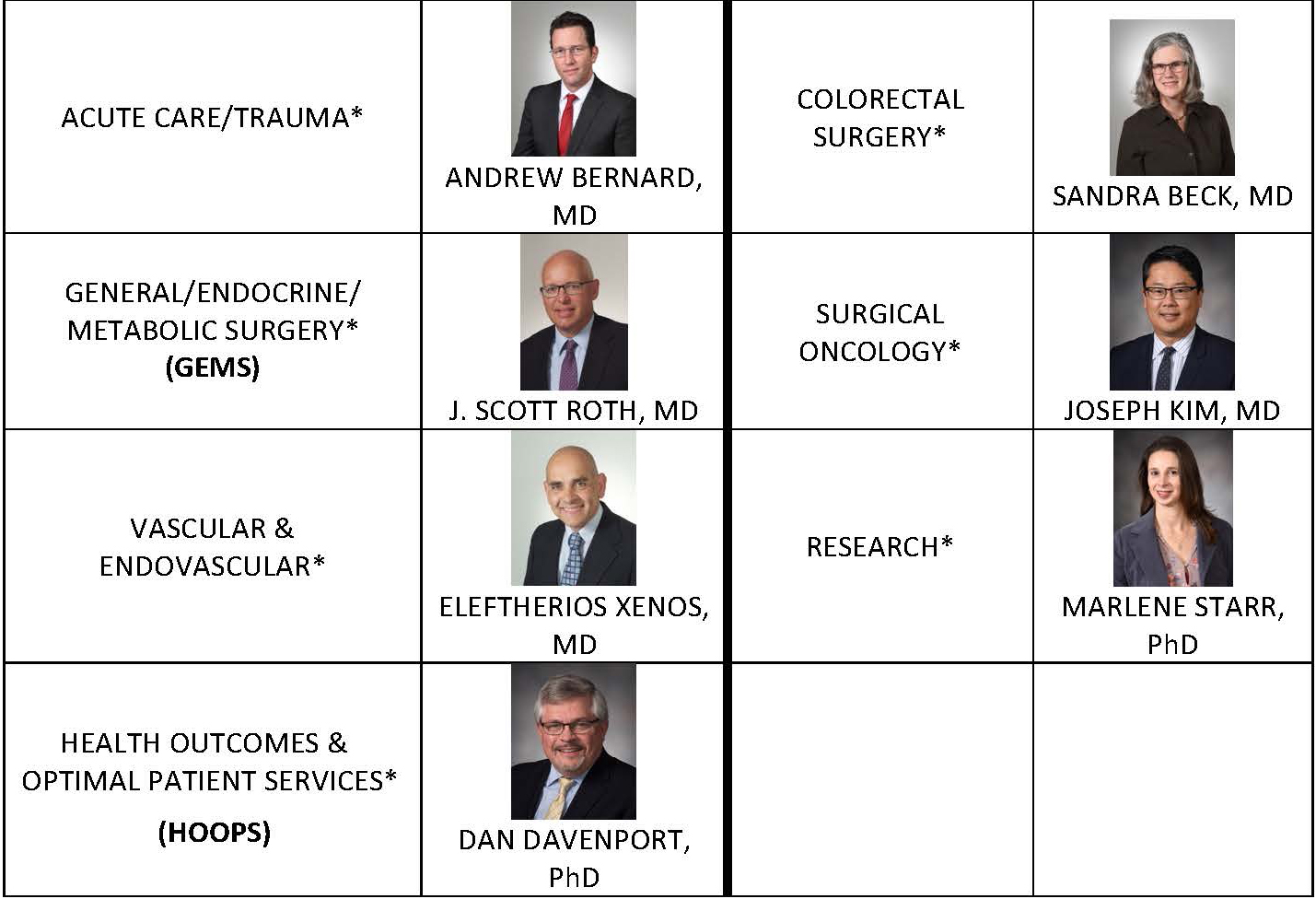Surgery chair unveils department re-organization, new divisions, and leadership
By Josh Shepherd
With the beginning of a new academic year this July, Dr. William B. Inabnet III, The Johnston-Wright Endowed Professor and Chair of Surgery implemented a re-organization of the UK Department of Surgery that expands its divisional structure, reflecting the significant growth the department has experienced over the last decade.
Among the more significant changes is the promotion of various sections of General Surgery into their own divisions. “Under the leadership of Dr. [Jay] Zwischenberger and Dr. Patrick McGrath [General Surgery Division Chief], General Surgery faculty grew to nearly 35 surgeons across five sections. It’s a great achievement, but it has made the division too big,” Dr. Inabnet said. The re-organization creates divisions composed of five to 10 surgeons, an ideal number that facilitates a de-centralized process of decision-making and allows units greater flexibility to flourish, Inabnet said.
The re-organization is also an effort to align the department with changes that Dr. Mark Newman, UK HealthCare EVPHA, and UK HealthCare will implement in the way funds flow to its various departments over the next two years, said Dr. Inabnet. Under that funding model, departments will be responsible for the revenues they generate and reap more directly the benefits of their work.
“Departments of Surgery tend to do very well in these types of models,” Dr. Inabnet said. One of the keys to success, however, is to reduce clunky bureaucracies that can impede progress. Breaking General Surgery’s sections down into smaller, independent units will allow them to build identity and work with their own resources.
The department will provide some central oversight to ensure that divisions keep in alignment with UK HealthCare, but the idea is to empower divisions and enable decision-making that is in their best interests, Dr. Inabnet added.
In addition to the new divisions and leadership, Dr. Inabnet announced that Dr. Pat McGrath accepted promotion as the new Vice Chair of Clinical Affairs. As the Director of the Physician’s Compensation Committee, Dr. McGrath has been a strong, behind-the-scenes advocate for fair and transparent compensation. He is a natural choice to fill this role for the department, Dr. Inabnet said.
Dr. Mark Evers, Director of the Markey Cancer Center, will continue in his role as Vice Chair for Research
One of the more significant changes in the organization structure is the transition of Vascular Surgery leadership from Dr. Eric Endean to Dr. Eleftherios Xenos.
Among his many leadership roles, Dr. Endean has spent over a decade as section chief of Vascular Surgery. During faculty discussions of the proposed department re-organization, Dr. Endean and Dr. Inabnet agreed that the time had come for a positive leadership change. It was a shared and mutual decision to recognize Dr. Eleftherios Xenos’ contributions to Vascular Surgery and give him an opportunity to lead this new division, Dr. Inabnet said.
There are no other changes in Dr. Endean’s status. He is not stepping down or retiring. He will continue his surgical practice and “keep his iron in” in anticipation of the exciting new developments that will soon occur in the division.
“There are great things on the horizon for Vascular Surgery, including the opening of a new aortic center and new clinical space in 2021,” Dr. Inabnet said.
Two new divisions created
In addition to the creation of new clinical surgery divisions, Dr. Inabnet also announced the creation of two entirely new divisions: The Division of Research, with Marlene Starr, PhD, as chief, and the Health Outcomes and Optimal Patient Services (HOOPS) Division with Dan Davenport, PhD, as its head.
Surgical research at UK currently ranks 17th in the nation. Though research forms one of the foundational pillars of the department, however, it is fragmented across divisions and there is some apparent redundancy of effort. By creating a dedicated Research division, the department aims to correct those deficiencies, facilitate better communication among surgery’s researchers, and centralize some of the general activities.
Dr. Starr agreed to take on the chief’s role and help define the function of the division going forward. “By creating this division, we can enhance the focus of our efforts. Our goal is to achieve top 10 NIH funding status in the next three years,” Dr. Inabnet said.
With regard to HOOPS, measuring health outcomes and optimizing patient care is already a well- established function within the department. Dr. Davenport heads up a core group of research nurses and statisticians that track patient outcomes and submit data to a number of state and national registries. Creating a formal division should enable the department to recruit top researchers in this important field. Dr. Davenport can also bring best practices into data management and enable faculty and department leadership access to the best outcomes research.
These are only the beginning of big new changes to come for the Department of Surgery as UK HealthCare transitions out of the COVID 19 pandemic and back into regular operations. In the next two years, these changes will equip the department to continue its progress and position itself as an even greater national leader.
